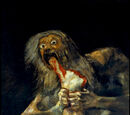
Something old, something new
"Are you trying to seduce me, mister Isle?"
I grin over the rim of my mug, taking the suggestion of a private trip to John's Magical Mystery Isle as nothing more than another of his countless joking attempts to get inside my pants. Lewd and suggestive comments are an integral part of conversation on the crew in general and between us in particular, as natural as breathing or taking a swig of rum.
I've always shot him down, laughingly claiming to be his holy grail, an unattainable asset wriggling just beyond his grasp. And honestly, that's the way I thought he preferred it too. Our friendship has been the one constant through both of our multiple failed relationships over the long span of years we've known each other and the one time he could have had me, giddy with the thrill of survival and shiny new loot, he turned me down for the sake of his girl.
I've just reminded him of this fact, a gentle little taunting of such rare opportunity squandered. Not that I really minded, in fact I was happy for his sake, if questioning the sanity of the intended proposal to the girl in question.
"Are you trying to seduce me, mister Isle?"
John grins back, though there's something strangely intent in the way he looks at me, something blunt and earnest in his tone:
"Well, why the hells not? It's not the worst idea, Sabs."
I think he's actually serious this time.
The realization takes me aback, and I find myself grasping for something other than the usual jokes in return as he continues with his persuading campaign, weaving a fanciful metaphore of it as his fingertip trails down my leathers.
"I was always sorta saving you for a rainy day", I try, though the counter is swift - every day is a rainy day in Narfell, so what am I really waiting for?
Really, why the hells not?
Because you're ~Johno~, because we're friends, because you've seen the absolute worst of me and still listened to my whining and woes, stood by me through all of my messes and never, ever passed judgement. Because you've made me laugh when I wanted to cry and kept me company when I could do neither. Because you're the only person I still truly care about in all of Narfell except for Puppy.
The list flies through my head as John's finger reaches my belt buckle, and suddenly the pros start outweighing the cons. We're friends, true, and screwing that up would be a disasterous thing. But it's not as if he doesn't know what he's getting into, he ~knows~ me and I know him.
"It's not the first time I've thought about it", he mumbles. "It was just never the right time, you know?"
Oh, I know all too well, but am suddenly left wondering how much of John's jokes over the years were really all that joking. The clown part is a mask, at least in part, hiding both a hard and ruthless side, aswell as something far softer, revealed only to those nearest him. I've seen glimpses of each, teasing him more than once about being a romantic.
I just never thought that side had anything to do with me.
My mind is reeling, spinning in an futile attempt to renavigate what I thought was known waters. Do I really want to do this, to risk wrecking both a perfectly good friendship and whatever it is I still share with Puppy?
I'm still angry with Puppy, I remind myself. Angry with the bone he can't let go or stop gnawing at, his relentless craving for revenge that sees him taking such idiotic risks. He could die, he could DIE in the deepest, darkest of forests, and I'd never find him. Hells, I might never even know what happened. It bubbles up inside me again, the worry and the fear, the futile rage of having to feel this way. He's heroic too, always being dragged off to this world-saving cause or the other. I don't mind that quite as much, except I don't trust the so called "good" guys to watch his back.
John, on the other hand, is actually sensible, contrary to what people might think of him. The things he'll risk his neck for are much the same as mine, as are the things he cares about. We share all this history, all these memories of people and events long since passed, the blood, the sweat and the tears, sweet victory, silly antics and bitter defeat. We make sense together, at least on paper. In reality, I'm still struggling with the idea.
It's mind-boggling. It's as if I'm seeing two John's at once, the old and the new, the friend and the would-be-lover. I can't treat it as a casual thing, because he matters to me, so much so that I have to consider the possibility.
The first kiss was experimental, just to see if I could get past the weirdness of it all without breaking into sudden laughter, to see if there was a spark somewhere behind it. It was a soft kiss, warm and unexpectedly tender. His usual grin nowhere to be seen afterwards.
"Well… that was new."
There ~is~ something there. Something new and still unknown, sprung from the old. I have to wonder if this attraction is rooted in anything more than nostalgia, the love of the life we once had, the ghosts of the people we both knew. But I don't know. The way he looks at me sometimes, the way he smiles... it frightens me, because while I love my old friend John, the new John is something else and what he wants, I'm not sure that I can offer. I'm tempted to try though.
He tells me there's no rush, to take my time and think it through. Meanwhile he showers me with gifts and surprises, the first of which is currently coiled up with Tess, purring as if it was a tressym too.
Nugget is a dragonet, a beautiful shining gold in colour and with an unfortunate attraction to anything with that same colour. He - or she, it's hard to know for sure - is a sneaksome, vocal little thief, quick as a greased weasel with wings to boot. In equal measures annoying and adorable, Nug of course won my heart over immediately, if not in the same way as Tess.
Something old, something new.
The same duality could perhaps be said to apply to my Puppy too, as lately it seems something new might be growing between us. Or something old, something always there, only just returning in strength. I never stopped loving him, though for the longest time, I had no fire left in me to stoke the smouldering coals. Not for him, not even for Luke, who came and went one last time.
It really was the end, this time. I wanted so much to let him rekindle our love, to trust him, forgive him, allow him back inside my heart and make it burn bonfire hot. I tried, but I just couldn't. Years apart and too many goodbyes left unspoken had finally done what nothing else could and put an end to my greatest passion.
Is that what opened the door to this something old or something new? Or, as I can't help but wish for, even knowing the impossibility, both?
There's something seriously wrong with me, always wanting both, never being completely satisfied with just one good thing that comes my way. Why do I keep reaching for more, the second I have what I want? Why can't enough ever be enough, why can't I just be content? Why oh why is it ever all or nothing?
I can blame the men in my life all I want, but there's a pattern here that even I can't stay blind to. When I'm happy, I want more, and when I'm miserable, I want nothing and no one. There's been times when it's worked, I mustn't forget that, long periods of time when just the one right person really was enough, when I was actually happy without reservations or partitions of the heart.
But now?
John's invitation still stands, and he's going to great lengths to convince me to give him a proper go of it. Do I try something new with a dear old friend, or build on the old with the one person I already know I love? It's hard to ask Puppy of anything at this point though, especially when I'm not even sure myself what it is I want or where we really stand now.
We talk of leaving sometimes, sailing off into the proverbial sunset, but I don't think he's done here yet, not in the way I am. It feels like nothing more than a fondly held daydream, but I entertain it nonetheless, picturing a variety of futures with him in my idle moments. But can any of it ever be more than daydreams?
I told him about John, hoping for... I don't know what, exactly. A reaction, a sign, something to help me decide or even have him decide for me. "You get a say in this, in case you hadn't figured that one out yet", I said. He said all the right things in return, being gentle, understanding, leaving the choice wholly in my hands while reassuring me that he'd be there regardless. He just wants me to be happy.
A small part of me was disappointed, I think, wanting him to put his foot down, to claim me somehow, to say there's an us beyond the fleeting moment. But he knows me, knows all too well how attempts to control me send me running in the other direction, how denying me anything just makes me want it more. It has to be my choice, but I'll be damned if I know how to make it when really, I'm still stupid enough to want both, but too much a coward to say so.
He was gentle in words, but made love to me with ferocity that night and again the following morning, leaving me aching in all the right places. Just then, it was enough, but in his absence I wonder. If I'm to stay here, in a region I feel less and less attachment to, are these meetings really enough, or do I need that something new to keep me grounded?
Curiously, Nugget stole a ring from the Puppy's pack, a beautiful gold ring with a large azure gem. In the dragonet's grudging returning of stolen goods, it ended up in the grass, gleaming tantalizingly. While Puppy stared, slack-jawed, John and I lunged for it, my hands proving the swifter. I thought he'd ask for it back, especially since I still walk around flaunting it, but instead he just stares when he thinks I'm not looking.
It fits disturbingly well on my finger, disturbingly well with the theme of this entry too, so much so that I'll end with the words that have echoed through my head all day, persistantly repeating themselves over and over:
Something old, something new, something "borrowed", something blue.







